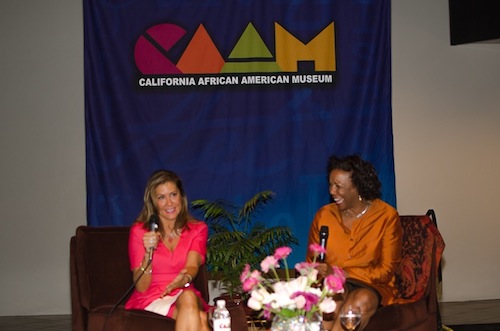
Kathleen McGhee-Anderson (left), Moderator Shirley Jo Finney (right)
Written by Chelsea Battle
In television writing circles, there is probably no higher aspiration than to have a million no’s to a script finally become a yes. Thus were the humble beginnings of multifaceted executive television writer, producer, and playwright Kathleen McGhee-Anderson, who after over two decades of creating extraordinary work is being honored at CAAM.
“I’m excited and I am humbled, and I really had to stop and ask myself ‘Why me’?,” the modest writer reveals. “Even though I know that when I came along what I was doing was different, I never thought that I would reach a point where I was considered important. And I think this is an important distinction and honor, so it makes me feel that all of the rejections are part of a bigger picture,” she reflects.
As one of the first Black women to work in the TV writer’s rooms, the award winning producer has written for and produced many popular shows, including Little House on the Prairie, The Cosby Show, Touched by an Angel, and most recently the ABC series Lincoln Heights. She boasts an impressive roster of network and film hubs which she has developed, sold pilots to, and collaborated with, including such heavyweights as NBC, Fox, CBS, Showtime, Columbia Pictures, and Paramount Motion Pictures.
Her climb to success has been quite remarkable. Hailing from Detroit, Michigan, Anderson always had a penchant for the arts, especially theater and writing. She attended public performing arts schools and landed roles in every school play while in high school. She also began writing short stories and giving readings at home for her family and close friends.
“Detroit really molded me into the artist that I later became,” Anderson muses. “I always wanted to live a creative, artistic life. My mom always pushed me to become a writer early on, I guess because she saw an inkling of ability in that area. Motown shaped me in terms of being a young person growing up during the Motown era and all the fabulous music and the beautiful performers, the fabulous clothes the women were wearing; and the men were so sexy and dynamic.”
But the glitz-and-glamour magnetism of the Motown era began to shape her in more ways than one. The underage high school student began sneaking out to night clubs, trying to become a part of the “sceney” lifestyle. She’d also decided that she didn’t want to go to college.
“My best girlfriend and I had a promise that we made that we were going to marry Motown artists,” Anderson explains. “I was going to marry David Ruffin and she was going to marry Smokey Robinson. We were hanging out in the clubs when we were in high school and our parents didn’t want us to do that. So when they got wind of this pact that we made my mother immediately shipped me off to Spelman College.”
It was during her time at Spelman that she was able to hone her writing skills. She graduated cum laude and then went on to film school at Columbia University, where she discovered that she wanted to be a director.
“I thought that it [film school] would be a good way for me to incorporate all of my interests. I learned that in making a movie I could use visuals and music and writing and so I decided that I wanted to be a director.”
She went on to marry actor Carl Anderson, who at the time was starring in the show Jesus Christ Superstar. He eventually got a short story she had written into the right hands. After it landed in the lap of Michael Landon, creator of Little House on the Prairie, she got her first big writing gig. Unfortunately, in the years that followed her opportunities were limited. Nearly a decade would pass before she got another big break.
“I thought I was on my way [after writing for Little House on the Prairie],” Anderson exclaims. “But I was not because I was an African American woman during a time when women were not normally writing and not hired to be on staff, let alone an African American woman. That is how they saw me. So when I walked into those rooms for an interview, I was not their vision of what a successful creative person looked like, or a person that they could look at and think, ‘We can invest this amount of responsibility because we know that she is going to create a quality project.’ There’s a lot of money involved in all of these choices and at the time a lot of bias. I was grateful for the opportunities, but I wanted to write drama that realistically mirrored African Americans and who we really are.”
Her tenacity paid off. While looking out into the audience at her honorary ceremony, she muses,
“It’s really thrilling to be able to sit back and assess 35 years,” Anderson remarks. “I am so honored. It makes me feel like all the projects that never got produced—which are far more than those that did—and all of the many areas I’ve tried to develop have gotten me to the point where I can elevate someone, or entertain or illuminate someone; then I feel very much like I didn’t waste my time. And I feel very fortunate that I could affect people’s lives, because that’s what I’ve always wanted to do. I always wanted to do good so apparently it’s worked.”